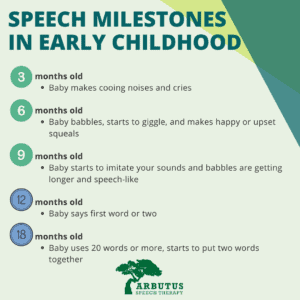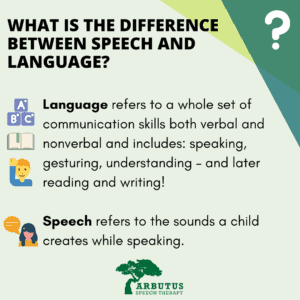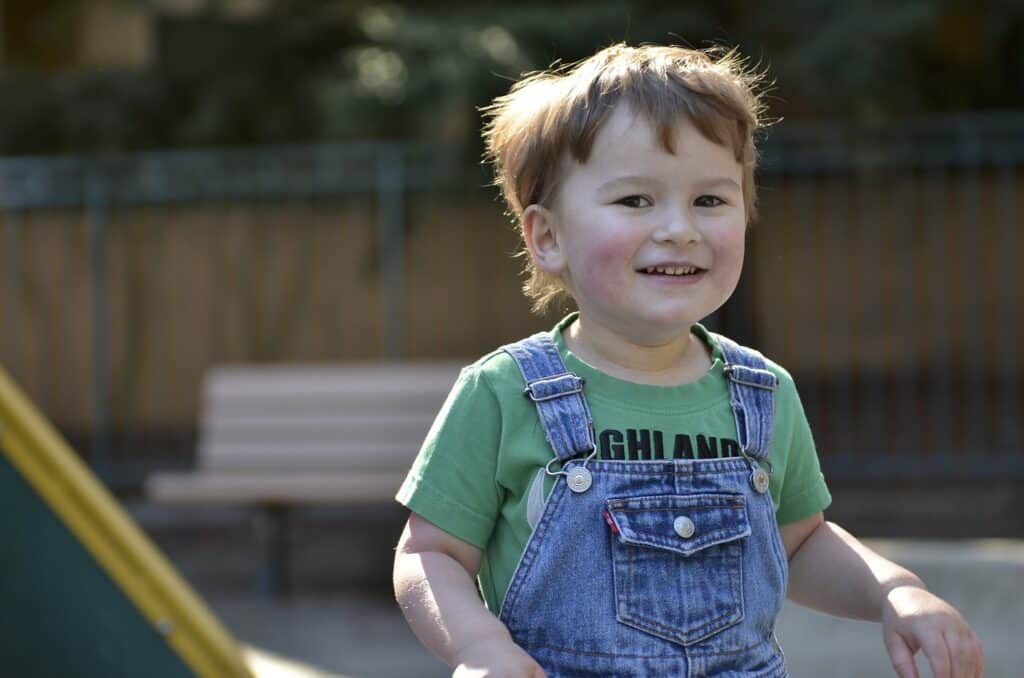A child’s first word and first step are expected around their first birthday. However speech and language milestones are not hard rules. The truth is, some children develop faster or slower than others.
A Speech Therapist can help you identify where your child is in terms of their developmental milestones. So, when should parents and caregivers be concerned that their child is not talking yet? Read on to find out when to contact a Speech-Language Pathologist (and everything else you’re wondering about speech and language in the first two years.)
When should I be worried?
As babies grow, they acquire new skills in a predictable sequence and timeline referred to as developmental milestones.
These milestones include physical, social and emotional, cognitive, and language skills. A child’s language milestones include all forms of communication including spoken language, gesture, speech, hearing, and understanding.
Did you know that your baby’s adorable sounds are helping them towards saying their first word? Take a look at the speech milestones you can expect leading up to your baby’s first birthday:

Children who aren’t reaching their milestones will not necessarily develop a problem with speech and language delay. There are normal developmental differences, and some children learn new skills faster or slower than others. Even so, Speech & Audiology Canada reports that up to 10% of children in Canada will begin school with a language disorder.
What should I be looking out for?
Parents often have an intuitive idea that their child is behind in their milestones. They may see other children the same age as their own and wonder “hmm my child isn’t at that level yet, is something wrong?” Or a well-meaning family member may ask, “She doesn’t talk a lot, does she?”. Other times, families may be so busy they haven’t had a chance to stop and think about what is normal or not.
Here are some signs of atypical language development that may require intervention:
| 4-7 months old | Not babbling |
| 7-12 months old | Makes only a few sounds or gestures |
| 7+ months old | Does not understand what others say |
| 15 months old | No first word |
| 18 months old | No consistent words |
| 18-24 months old | Words are not easily understood |
| 24 months old | Not putting 2 words together “mommy milk” |
| 2-3 years old | Has trouble playing and talking with other children |
| 2.5-3 years old | Has trouble with early reading and writing skills |
Other concerns you can speak to your Speech-Language Pathologist about include:
- Not responding to their own name
- Not responding to loud noises
- Excessive drooling
- Problems sucking, chewing, or swallowing
- Sudden loss of speech and/or language skills
- Stuttering

“They’ll grow out of it” and other common misconceptions
It can be difficult for a parent to know if their child is a “late bloomer” or if they have a speech or language delay. Unfortunately, there are many misconceptions that make it more difficult for parents to make an informed judgement on whether to seek help. Here are some of the common myths around speech and language development:
Myth #1: “Bilingual children are prone to having speech and language delays.“
Reality: There is no evidence that suggests that speaking more than one language causes a speech or language delay. There may be an initial silent period and smaller vocabulary in each language. But, when considered together, bilingual children have equal or larger vocabularies than monolingual children – with cognitive benefits later in life!
Myth #2: “Boys speak later than girls.“
Reality: A child’s gender should not be the reason that a speech-language assessment is postponed. Studies show that girls do develop language skills faster than boys, however not to the extent that it makes a significant difference to long term outcomes. That said, boys are 4 times more likely to have Autism than girls, and two-thirds of children with Autism have associated language disorders. However, other factors such as parents’ level of education and involvement in children’s learning are much stronger predictors of early language abilities than sex or biology.
Myth #3: “They’ll grow out of it. “
Reality: A child’s speech and language will develop at different rates, but this advice can provide a false sense of comfort. Normal speech and language development can be assessed by a Speech-Language Pathologist in a few short sessions. This will provide you with conclusive information about your child’s development. Unfortunately, when left untreated, speech and language delays persist in 40-60% of kids.
“It can be difficult for a parent to know if their child is a “late bloomer” or if they have a speech or language delay.”
Arbutus Speech Therapy
What causes speech and language delay?
The most common reason that a child is delayed in their language is due to a developmental language disorder (DLD). This is the term used to identify children who have language problems that create obstacles to communication or learning in everyday life. Children with a DLD have difficulties that will not resolve on their own and are not associated with a known condition.
Other causes of speech and language delays are:
- Hearing loss
- Language deprivation
- Premature birth
- Neurological conditions such as cerebral palsy or traumatic brain injury
- Autism Spectrum Disorder (ASD)
- Oral-motor disorders (Childhood Apraxia of Speech)
- Selective mutism
First steps if you think your child might have a speech or language delay
Your first call should be to your family doctor or pediatrician, who may then make a referral to your local public health unit for a comprehensive assessment. This is provided by the public health system, which means it is free of charge.
If Autism is suspected, they will refer you to either a developmental pediatrician for further assessment or directly to BC Autism Assessment Network (BCAAN) for a free Autism Assessment.
Unfortunately, in both cases, public health waiting lists can be long, sometimes a year or more. To learn more about the process of receiving a diagnosis in BC, you can review our guide to receiving an Autism (ASD) Diagnosis.
I don’t want to wait a year for my child to see a specialist – what are my options?
You have been in contact with public health and have secured a spot on the wait list, only to find out you might be waiting more than a year to receive an assessment. There are private practitioners in your community who will have much shorter waiting lists, or possibly no waiting lists at all. Here are some links you can use to find private healthcare professionals in your community:
- For Speech-Language Pathology services in Vancouver and the Lower Mainland, contact Arbutus Speech Therapy for a free phone consultation
- Occupational Therapists in BC: Canadian Association of Occupational Therapists
- Physiotherapists in BC: Canadian Alliance of Therapy Regulators
Arbutus Speech Therapy is here to help
The process of working through your child’s possible speech and language problems can be complicated. With so much information, it can be hard to know where to begin.
Speaking directly to a Speech-Language Pathologist can shortcut your path to getting your child the help they need to reach their potential. We are here for you and can help connect you to the resources, information and professionals that will help. Contact Arbutus Speech Therapy today or Book Online for a free phone consultation with a registered Speech-Language Pathologist.
Check out our other articles:
Enhancing Executive Function in Autistic Children: How Speech Therapy Supports Neurodivergent Skills Development
Executive function skills (such as planning, organizing, self-regulation, and working memory,) are…
Speech Therapy for Multilingual Children: Tips and Benefits
Raising children in a multilingual environment is increasingly common, as many parents…
Stuttering: Tips for Helping Your Child
It is an exciting milestone in a toddler’s life when they begin…
Understanding the Signs of Autism in Children: A Parent’s Guide
Autism Spectrum Disorder (ASD) affects communication and behavior in ways that can…
14 Simple Speech Therapy Tips Parents Can Use at Home
We’re often asked about simple tips that parents can use at home….
Building a Healthcare Team: A Guide for Parents of Kids with ASD
For parents with an Autistic child, it can feel overwhelming trying to…






